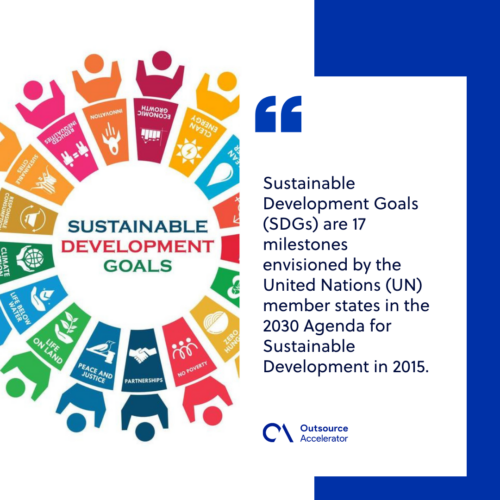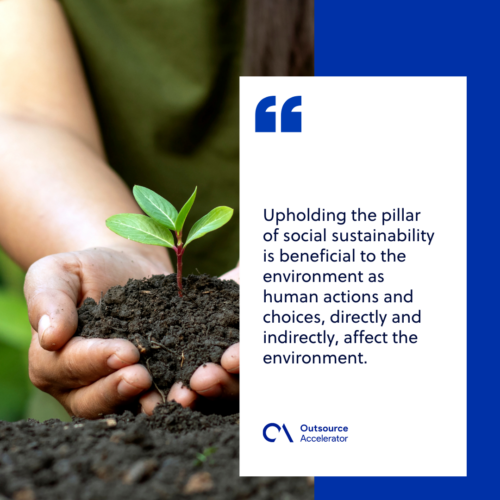Sustainable Development Goals (SDGs)
Definition
What are sustainable development goals?
Sustainable Development Goals (SDGs) are 17 milestones envisioned by the United Nations (UN) member states in the 2030 Agenda for Sustainable Development in 2015.
The Agenda presents a collaborative action plan to achieve peace and prosperity for the Earth and its people — from the present to the future. At its core are 17 goals — calls for action by the UN’s member states — that can be realized through global cooperation.
The UN set up the goals in recognition that eradicating poverty must go hand-in-hand with policies that will improve the state of education and health, lessen inequality, and encourage economic growth while addressing the climate crisis and environmental preservation.

These sustainable development goals tackle different aspects that require improvement or urgent actions:
- No poverty
- Zero hunger
- Good health and well-being
- Quality education
- Gender equality
- Clean water and sanitation
- Affordable and clean energy
- Decent work and economic growth
- Industry, innovation, and infrastructure
- Reduced inequalities
- Sustainable cities and communities
- Responsible consumption and production
- Climate action
- Life below water
- Life on land
- Peace, justice, and strong institutions
- Partnerships for the goal
The UN built the SDGs upon decades of work by different countries and the organization as a whole, including its Department of Economic and Social Affairs (UNDESA).
UN initiatives preceding the 2030 Agenda’s SDGs:
- Agenda 21 – adopted by 178 countries during the 1992 Earth Summit in Rio de Janeiro, Brazil.
- Millennium Declaration – unanimously adopted by UN member states during the 2000 Millennium Summit at the UN headquarters in New York. The Summit led to the further development of eight Millennium Development Goals (MDGs) aimed at reducing extreme poverty by 2015.
- Johannesburg Declaration on Sustainable Development and the Plan of Implementation – adopted during the 2002 World Summit on Sustainable Development in South Africa.
- The Future We Want – an outcome document adopted inter alia by member states at the 2012 UN Conference on Sustainable Development in Rio de Janeiro, Brazil.
- 2013 – the UN General Assembly created a 30-member Open Working Group to come up with a proposal on SDGs.
- 2015 – negotiations on the General Assembly’s post-2015 development agenda started, culminating in the adoption of the 2030 Agenda.
The following agreements were also adopted in 2015:
- Sendai Framework for Disaster Risk Reduction
- Addis Adaba Action Agenda on Financing for Development
- Paris Agreement on Climate Change
Pillars of SDGs
The SDG’s sustainability aspect can be broken down into three interconnected fundamental pillars: social, economic, and environmental sustainability. True sustainability is envisioned to be possible when the three pillars are implemented in perfect balance.
Social sustainability
Under the pillar of social sustainability are human health, environmental justice, education, resource security, and other essential aspects of society.
Upholding the pillar of social sustainability is beneficial to the environment as human actions and choices, directly and indirectly, affect the environment.
The interdependence of the two can be directly seen in the effect of slums in their immediate environment. In the Philippines, the slum areas around the Pasig river have contributed significantly to the river’s deterioration.

Economic sustainability
Under economic sustainability, profitability, job creation, and the production, distribution, and consumption of goods are considered. This pillar is essentially about creating long-term economic growth and development without sacrificing environmental and social welfare.
The pillar of economic sustainability links with social and environmental sustainability as it would provide the means of attaining economic prosperity. Achievement of financial security would, in turn, foster social justice and lead to the reduction or elimination of societal problems that contribute to environmental issues.
Environmental sustainability
This pillar focuses on the planet’s well-being and the problems, such as the climate crisis, greenhouse gas emissions, and loss of biodiversity. Environmental sustainability significantly impacts social welfare and economic development, especially in developing countries.
Humans’ health and livelihood are highly dependent on their natural environment. Even in urbanized areas with non-agricultural economies, adverse environmental effects such as rising sea levels, droughts, and even the development of sinkholes threaten peoples’ lives and economic stability.
Environmental changes can also directly impact the economy through the destruction of crops, declining ecotourism, or loss of livelihoods that depend on local wildlife.
Importance of SDGs
The SDGs provide a framework for developing plans to combat the international community’s global challenges. These goals serve as guides for crafting policies that would ensure the continuity of the human species and the conservation of the planet’s wildlife.
Challenges to SDGs
Achieving Agenda 30’s 17 SDGs is a massive undertaking between the members of the international community. As such, its implementation will understandably encounter challenges commonly faced by governments.
Among the key challenges that hinder sustainable development are:
- Challenges in governance such as the lack of political will to implement sustainable long-term development programs.
- Instability and conflict between countries, even among members of the UN.
- Implementation issues such as difficulties in implementing changes to fit into the local context.







 Independent
Independent




